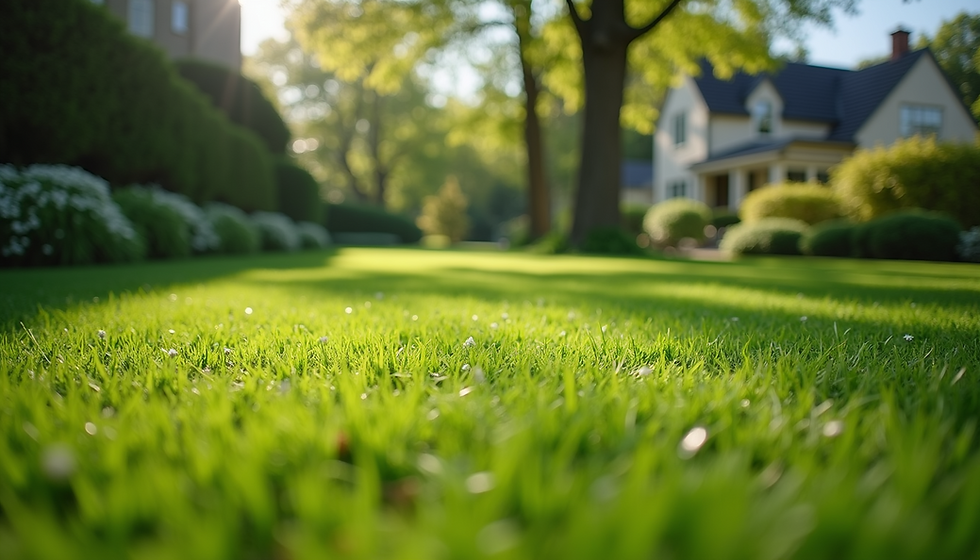Why Regular Irrigation System Maintenance Matters
- Baltazar Villanueva
- Jul 8, 2025
- 4 min read
Keeping your garden and landscape vibrant requires consistent care. One of the most crucial aspects of maintaining a healthy landscape is ensuring your irrigation system is functioning properly. Regular maintenance can save you time, money, and headaches down the road. In this blog post, we will explore why irrigation maintenance is essential, the steps involved in maintenance, costs, and how to perform a basic inspection yourself.
The Importance of Irrigation Maintenance
A well-maintained irrigation system ensures that your plants receive the water they need without wasting resources. When your irrigation system works efficiently, it helps to promote healthy plant growth, reduces water bills, and contributes to environmental sustainability.
Moreover, neglecting irrigation system maintenance can lead to leaks, clogs, and other issues that can create a tremendous headache. According to the EPA, irrigation systems can lose up to 50% of water due to leaks and inefficient operation. Regular upkeep can mitigate these losses by identifying and repairing issues before they escalate.

Common Issues with Irrigation Systems
Understanding common issues that arise in irrigation systems can help you appreciate the need for regular maintenance. Here are a few frequent problems:
Clogs: Dirt and debris can build up in your system, causing reduced water flow. A clogged sprinkler head or drip line can lead to inconsistent watering.
Leaks: Pipes can crack or joints may loosen, leading to water loss. This not only wastes water but can also create waterlogged areas in your landscape.
Erratic Watering: Problems with timers, sensors, or programming can result in over or under-watering, which can compromise your plant's health.
Broken or Damaged Sprinkler Heads: Sprinkler heads can be broken by lawnmowers or foot traffic. If not addressed, these issues can lead to uneven watering patterns.
Identifying these issues requires regular inspections and prompt repairs.

How Much Does Irrigation Maintenance Cost?
The cost of maintaining an irrigation system can vary widely depending on the complexity of the system and the maintenance tasks required. Basic maintenance, such as checking for leaks and blockages, may cost a few hundred dollars a year.
If you hire professionals for comprehensive care, the costs can significantly increase. Here are some typical expenses to consider:
Seasonal Check-Up: This usually costs around $75 to $150, depending on whether it's spring start-up or winterization.
Repairs: Fixing leaks or replacing broken parts can range from $50 to several hundred dollars, depending on the parts needed.
Regular Inspections: Professional companies may charge a monthly or annual fee for ongoing maintenance. This can be anywhere from $200 to $1,000 per year based on your needs.
Investing in regular irrigation system maintenance may seem expensive, but it can save you a great deal compared to the cost of replacing an entire system or trying to salvage plants that have been over or under-watered.
Practical Steps for Maintenance
To keep your irrigation system in peak condition, you can follow these maintenance tips:
Inspect Regularly: Every season, inspect your system for leaks, clogs, or irregular watering patterns. Look for pools of water or dry patches that could indicate issues.
Clean Filters and Sprinkler Heads: Take the time to remove debris from filters and clean sprinkler heads monthly. This simple step ensures proper water flow and helps prevent clogs.
Check Timer Settings: Ensure that the timers are programmed correctly, taking into account seasonal changes and weather conditions. Utilize rain sensors if available to adjust your watering schedule.
Test the System: Run the system periodically to check for performance. Look for spray patterns and make adjustments as necessary.
Winterize Your System: In cooler months, be sure to winterize your system to prevent pipes from freezing. This typically involves draining the system and blowing out remaining water.
Regular inspection and maintenance will not only keep your plants healthier but can also extend the lifespan of your irrigation system.

Benefits of Consistent Maintenance
When it comes to your landscape, the benefits of regular irrigation system maintenance are far-reaching:
Cost Efficiency: Avoid unnecessary expenses on water bills and repairs. A well-functioning system conserves water, which translates to savings.
Plant Health: Consistent and adequate watering leads to healthier plants. This serves to beautify your outdoor space and increase property value.
Environmental Impact: Efficient irrigation means conserving water, a precious resource. By maintaining your system, you're doing your part for the environment.
Peace of Mind: Knowing that your irrigation system is well-maintained allows you to relax and enjoy your garden without worry.
Investing time and resources into regular maintenance yields long-term rewards for your landscape and your wallet.
Take the Next Step
Don't overlook the importance of your irrigation system. Regular maintenance is not just an option, it's a necessity. By keeping your system well-tuned, you can ensure that your garden remains healthy, vibrant, and efficient.
For professional assistance, consider hiring experts in irrigation system maintenance. They can provide valuable insights and services to keep your system in check. If you wish to learn more about how professionals can assist you, feel free to visit this link.
By prioritizing the upkeep of your irrigation system, you're committing to a sustainable and beautiful landscape. Happy gardening!




Comments